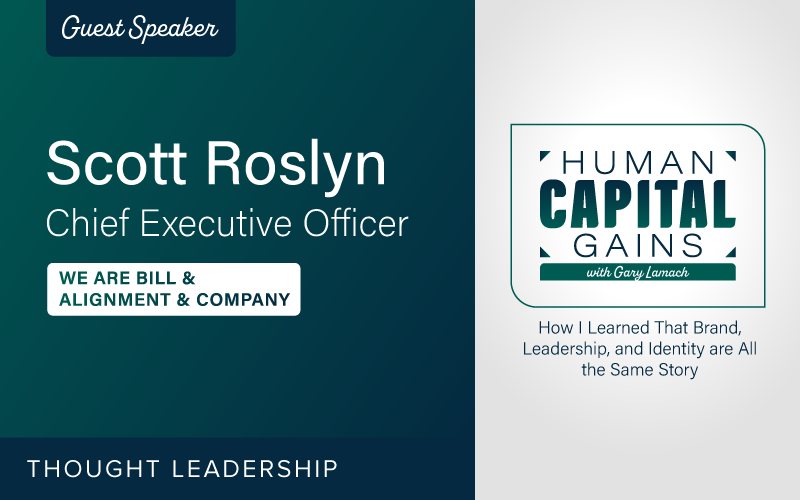When I first met Scott Roslyn, I thought I was just talking to the CEO of a brand consultancy. What I came to learn is that his work—first with We Are Bill and later with Alignment & Company—reveals something deeper. Building brands is human work. It's emotional, reflective, and complex. It mirrors what happens to leaders during times of change.
In our conversation on Human Capital Gains, Scott and I talked about how identity, business, and leadership intersect. We explored the emotional side of reinvention, why perception often lags behind reality, and how executives face their biggest transformations internally, not just in the market. The lessons I took away weren’t just about brand. They were about growth—personal and professional.
Why We Are Bill Exists
When Scott described We Are Bill, he called it a brand strategy and innovation consultancy. But what struck me was how personal their work is. He said they come in during moments of creation or reinvention. That’s not just about messaging or design—it’s about helping people let go of what no longer fits.
Especially with startups or PE-backed companies, the brand often falls behind. Founders are busy building, hiring, and shipping. The story they’re telling—on their website or to the market—is frequently outdated. That disconnect is where We Are Bill steps in.
They help teams recalibrate and reconnect their internal evolution with the external story. That requires honesty. Scott told me, “Websites are lagging indicators of a company's potential.” It’s a great line, and it’s true. He and his team ask the hard questions. They reflect what’s real. They don’t just dress things up—they uncover the truth.
Who Is Bill?
Yes, I asked Scott the question everyone asks: Who’s Bill?
The story is fantastic. They named the company after the spirit of Bill Withers and the song “Lean On Me.” Then it became a whole universe—Bill Murray, Billie Holiday, William Shakespeare. All these Bills represent different forms of greatness. Characters with real depth.
Scott and his co-founder wanted a name that felt human, familiar, and even a little funny. They found it. We Are Bill became more than a name. It became a philosophy. A way of being close, relational, and helpful without ego.
He said, “It’s about humanity and proximity and simplicity.” That stuck with me. It explains why their work resonates.
Why They Stay Small on Purpose
What impressed me most about We Are Bill is how intentional they are about staying small. They don’t chase growth for its own sake. They focus on doing great work with a small number of clients.
Scott said, “We decided to not grow big, but rather be great.”
They don’t advertise. They don’t submit for awards. Their clients—which include brands like AB InBev, Brooks Brothers, Aston Martin F1, and Xerox—come through referrals. That says a lot. And when clients tell them it feels like they’re the only client on the roster, it’s not just a compliment. It’s the goal.
The Shift to Alignment & Company
What fascinated me was how naturally the brand work led Scott into coaching. He realized they weren’t just working on companies—they were working on the people inside them.
Founders and CEOs were in their own transitions. And they didn’t have many safe spaces to talk about it. So when someone asked if he’d considered coaching, it made sense. He’d done the inner work himself. He’d lived through reinvention. He knew what it meant to feel out of alignment and what it took to return to center. That became the foundation for Alignment & Company.
Now, Scott works with executives facing big questions: Who am I now? Where am I going? What kind of leader do I want to be? It’s not about branding—it’s about living with clarity.
Loneliness at the Top
This part hit hard.
Scott told me that at the highest levels—CEOs of public companies—loneliness is real. The pressure is intense. And often, people stop telling you the truth. One CEO once told me, “Everybody was lying to me. I just had to figure out which lies would hurt the company and which ones wouldn’t.”
That line came rushing back during our conversation.
Scott’s coaching creates space for truth, reflection, and personal reinvention. It starts inside, not just in the boardroom.
What Stuck With Me
I asked Scott what surprised him most. He said it’s how even high achievers wrestle with fear and imposter syndrome. The difference is that some have the tools and support to move through it. Others don’t.
He said, “Whether I’m doing brand work or coaching, I’m really doing the same thing. I’m helping people see themselves more clearly, tell their story more truthfully, and build something they believe in.”
That’s it. That’s the work.
Final Thought
If you’re leading through change right now—in your business or your life—keep going. It’s supposed to feel hard. That doesn’t mean you’re doing it wrong. It probably means you’re doing something meaningful.
And if you need someone to lean on, now you know who Bill is.
To learn more about how to build leaders who think like CEOs, click here.




_Blog%20Featured%20Image%20800x500.png?width=388&name=Recap%209-4-25%20Why%20You%20Should%20Train%20Sales%20Leaders%20Like%20Cats%20(Not%20Dogs)_Blog%20Featured%20Image%20800x500.png)


